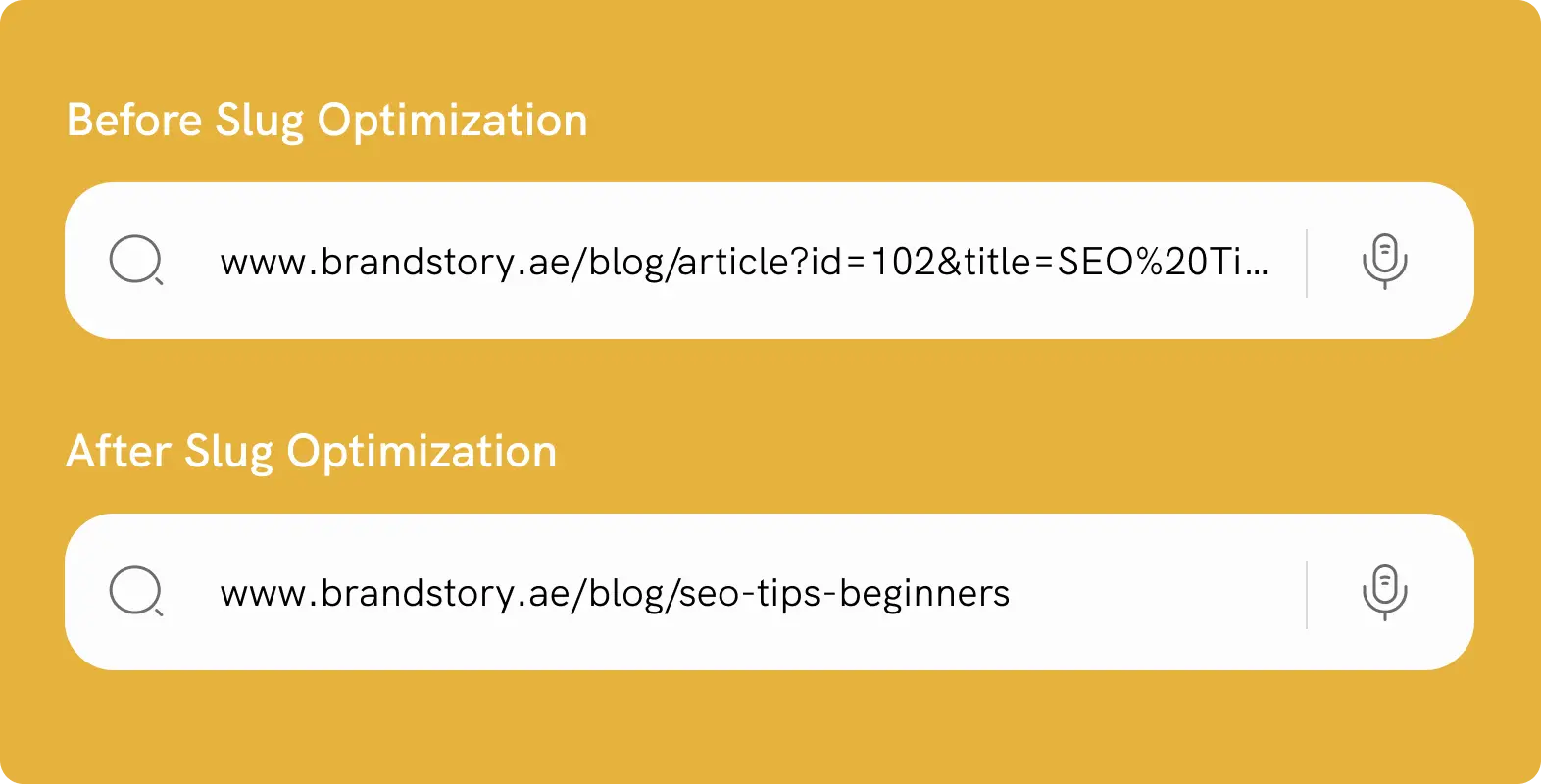In the ever-changing world of search engine optimization, every tiny detail counts, and URL slugs are no exception. Many a time, an unconscious underestimation of URL slugs results in quite a few missed opportunities in how search engines view and rank the content. At BrandStory UAE, we believe any SEO opportunity to improve visibility and drive traffic should be leveraged and maximized. Let's briefly go through what URL slugs are, their importance, and how they can be optimized for SEO success.
What Is a URL Slug?

A URL slug is the part of a URL that occurs after the domain name and path. It usually represents a page or a post within a site's hierarchy. For instance, in the URL:
www.brandstory.ae/blog/url-slugs-and-seo
The slug is url-slugs-and-seo.
It serves a dual purpose:
- It identifies the content of the webpage.
- It should be readable and agreeable for both users and search engines.
Why Are URL Slugs Important for SEO?
URL slugs contribute to SEO in several key ways:
- Keyword relevance: Having target keywords in the slug allows search engines to understand what the webpage is about.
- User experience: Clean and readable URLs instill trust and improve click-through rate.
- Crawlability: Short and consistent URLs are easy to crawl and index for search engines.
- Sharing and linking: Short and descriptive slugs are easier to share and remember.
Best Practices for SEO-Friendly URLs
Now comes the interesting part that will highlight best practices to ensure that your URL slugs are optimized for search engines while still being user-friendly.
1. Keep It Short and Simple
Long URLs are harder to read, understand, and share. Your slug should be concise—ideally, 3-5 words. It should summarize the page content using just a few key terms.
Example:
Good: /seo-basics-guide
Poor Example: /everything-you-need-to-know-about-SEO-for-beginners
Tip: Eliminate unnecessary stop words like ‘and’, ‘or’, ‘the’, and ‘to’.
2. Include Target Keywords
Just as you would in headlines, slugs are also a good place for your target keyword. It helps Google gauge the relevance of the page which can increase its visibility in search results.
Example: If your keyword is "digital marketing strategy," a slug-like:
/digital-marketing-strategy
Is perfect.
Avoid keyword stuffing—only use the keyword once and make sure it fits naturally.
3. Use Hyphens to Separate Words
Always use hyphens (-) to separate words in your slug. Google recommends this, as it helps with readability and indexing.
Correct: /social-media-trends
Incorrect: /social media trends or /social_media_trends
Why hyphens? Search engines treat hyphens as spaces, making it easier to parse.
4. Avoid Special Characters and Numbers
Special characters like &, %, ! or even symbols like @ or + can confuse search engines and browsers. They often lead to encoding issues or broken URLs.
Instead of: /how-to-do-seo@2025
Use: /seo-guide-2025
Avoid arbitrary numbers unless they indicate a value, such as a year (e.g., 2025) or model number.
5. Keep it Lowercase
Some servers treat URLs as case-sensitive, especially after the domain name. Using lowercase slugs avoids confusion and potential 404 errors.
Preferred: /web-design-dubai
Avoid: /Web-Design-Dubai
At BrandStory UAE, we standardize all slugs to lowercase to maintain uniformity across platforms.
6. Make Slugs Reflect Page Content
The slug should align closely with the content on the page. Misleading or vague slugs can harm SEO and increase bounce rates.
Bad Example: /page-1 or /post-123
Good Example: /content-marketing-trends-uae
This transparency builds trust and improves click-through rates on search engine result pages.
7. Avoid Dynamic Parameters in Slugs
URLs with parameters like (?id=123&cat=5) are less readable and harder to optimize.
Not SEO-friendly: /product?id=567
SEO-friendly: /samsung-galaxy-s21
Static, descriptive URLs are easier for both users and search engines to understand.
8. Ensure Slugs Are Unique
Each slug should be unique across your site. Duplicate slugs can confuse search engines and lead to indexing issues.
At BrandStory UAE, we often use tools like Screaming Frog or SEMrush to audit our URLs and eliminate duplicates.
9. Don’t Change Slugs Frequently
Once a URL is live and indexed by search engines, changing it can break existing backlinks and hurt SEO. If you must change a slug, always implement a 301 redirect to maintain link equity.
Tip: Plan your slug structure in advance, especially for cornerstone or evergreen content.
10. Localize When Appropriate
For businesses targeting specific regions, including location-specific keywords in the slug can improve local SEO.
Example:
/web-development-Dubai
This signals to search engines that your service is relevant to searchers in Dubai, increasing local visibility.
Real-World Example
Before:
www.brandstory.ae/blog/article?id=102&title=SEO%20Tips%20for%20Beginners
After:
www.brandstory.ae/blog/seo-tips-beginners
Result: The click-through rate increased by 18%, and the average ranking improved from position 14 to position 8.
Clean, well-crafted slugs are more appealing to users and give Google clearer context.
BrandStory UAE’s Pro Tip: Structure URLs Holistically

Remember, slugs are just one part of a broader URL. At BrandStory UAE, we treat URLs as part of a strategic site architecture. That includes:
- Clean, simple folder paths.
- Logical hierarchy (e.g., /services/SEO for structured hierarchy vs /services as a flat structure).
- Consistency across all slugs and categories.
Think of slugs as micro-headlines—they should offer a quick, digestible summary of what the page delivers.
Tools to Help You Optimize URL Slugs
Several tools can assist in crafting and analyzing your slugs:
- Yoast SEO (for WordPress users)
- Google Search Console (to monitor performance)
- Screaming Frog (for auditing URLs)
- Ahrefs / SEMrush (for keyword research and URL health)
At BrandStory UAE, we leverage these tools in our everyday SEO strategies to ensure our clients’ slugs support their overall visibility goals.
Conclusion
URL slugs may be small, but they play a mighty role in on-page SEO. From keyword targeting and user trust to shareability and search engine clarity, a well-optimized slug can be the difference between ranking on page one or being buried under the competition.
At BrandStory, our approach to SEO leaves no stone unturned. Clean, keyword-rich, and consistent slugs form a foundational part of our web strategy for clients across industries. Whether you’re launching a new website or optimizing an old one, focusing on your slugs is a quick win with long-term results.
Need help cleaning up your website’s URLs or developing a full-scale SEO strategy in the UAE?
Contact the best SEO agency in Dubai today, we’ll build you a digital presence that’s sleek, search-friendly, and built for success. Let us help you optimize every click.
We are BrandStory
Get in touch with us at info@brandstory.in to create a pleasant experience for your audience and a great success for your business.








